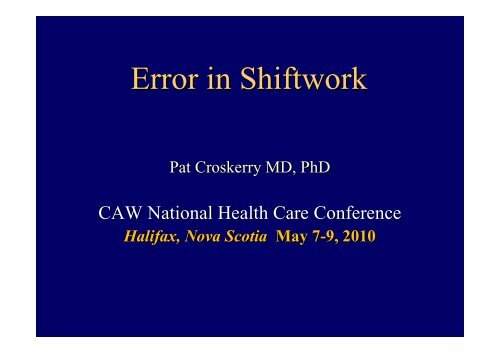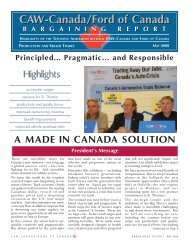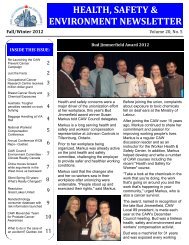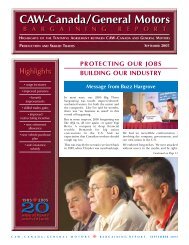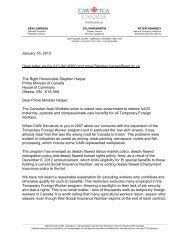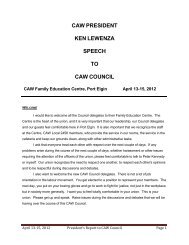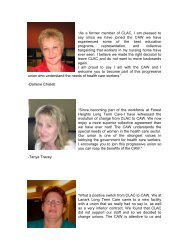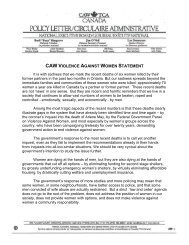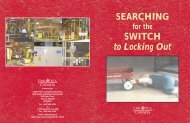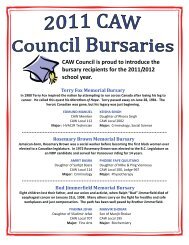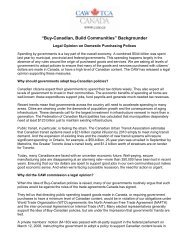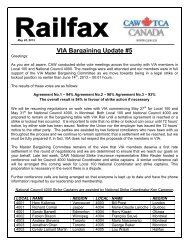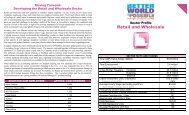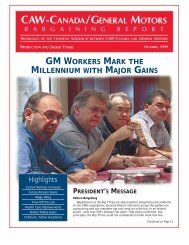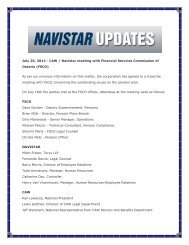Shift - CAW
Shift - CAW
Shift - CAW
You also want an ePaper? Increase the reach of your titles
YUMPU automatically turns print PDFs into web optimized ePapers that Google loves.
Error in <strong>Shift</strong>work<br />
Pat Croskerry MD, PhD<br />
<strong>CAW</strong> National Health Care Conference<br />
Halifax, Nova Scotia May 7-9, 7<br />
2010
What is <strong>Shift</strong>-Work<br />
• Day shift<br />
• Evening shift<br />
• Night shift<br />
• Rotating shifts<br />
• Permanent shifts
In Australia<br />
shift work<br />
is defined as<br />
‘aa workplace hazard’
In medicine, the patient is an<br />
integral component of the<br />
workplace
Memorable Night <strong>Shift</strong>s<br />
• Titanic<br />
• Exxon Valdez<br />
• Three Mile Island<br />
• Bhopal<br />
• Chernobyl<br />
• Space Shuttle Challenger<br />
• Westray<br />
• 15 - 20% of transportation accidents<br />
(greater than drugs and alcohol combined)
Circadian Low Point<br />
…the level of performance of someone who<br />
has been up all night equates to a blood alcohol<br />
level of 0.1%. In effect, by 0400 hrs, the<br />
performance of nurses and physicians, up since<br />
the previous day, is equivalent to being legally<br />
intoxicated.<br />
Dawson and Reid, Nature 1987
In healthcare, the patient is a<br />
component of the workplace
Our major<br />
adaptation has<br />
been to the light<br />
(and heat) of the<br />
sun
Our<br />
natural<br />
circadian cycle<br />
is about<br />
25 hours
FromColeman 1986
Which explains why<br />
it is sometimes<br />
difficult to get out of<br />
bed on<br />
Monday mornings
Endogenous<br />
Clock<br />
Entrainment<br />
of Physiological<br />
Parameters<br />
24 hrs<br />
Physiological<br />
Rhythms<br />
Zeitgebers
Zeitgebers<br />
• Light<br />
• Melatonin<br />
• Sound<br />
• Smells<br />
• Social<br />
• Meals<br />
• Activities
Use zeitgebers to minimize<br />
impact of shift work
Prolonged<br />
Wake-State<br />
<strong>Shift</strong>work<br />
Ill-Health<br />
Circadian<br />
Dys-synchronisation<br />
Fatigue<br />
Acute<br />
Sleep<br />
deprivation<br />
Chronic partial<br />
Sleep<br />
deprivation<br />
Neurocognitive deficits<br />
+<br />
Negative Mood States<br />
Impaired clinical performance
‘…there is no evidence to suggest that any<br />
amount of training, motivation or<br />
professionalism is able to overcome the<br />
performance deficits associated with fatigue,<br />
sleep loss, and the sleepiness associated with<br />
circadian variations in alertness’<br />
Institute of Medicine, 2004
Main Issues<br />
• Circadian rhythms<br />
• Impact on worker<br />
• Impact on patient
‘… circadian disruption is<br />
the equivalent of all the<br />
instruments in the<br />
orchestra playing their<br />
own separate tune’
Not only that, but we are different from<br />
each other and we change as we age….
Diurnal Types<br />
Morning Active (Larks)<br />
Intermediate<br />
Evening Active (Owls)
Chronotypes<br />
(M-types or E-types) E<br />
• People tend to be one or the other<br />
• Women are more M-typeM<br />
than men<br />
• We get more M-typeM<br />
as we get older
Ageing and Sleep<br />
Alertness<br />
Secretion/amplitude melatonin<br />
Insomnia<br />
Awakening from sleep<br />
Duration of arousal<br />
Moodiness<br />
Advancing phase activity<br />
Jet lag problems<br />
Sensitization to noise during sleep<br />
Stage 3 and 4 sleep<br />
Sleep apnoea<br />
Snoring
Ageing and <strong>Shift</strong> Work<br />
De-synchronization tendency<br />
Adjustment to circadian phase shift<br />
Health problems<br />
After 40-50 years
Clinical Symptoms of Sleep Deprivation<br />
• Longer reaction time<br />
• Lapses in attention or concentration<br />
• Lost information<br />
• Errors of omission<br />
• Poor short term memory<br />
• Poor mood (increased fatigue, confusion, stress,<br />
irritability)<br />
• Reduced motivation<br />
• Distractibility<br />
• Sleepiness<br />
• Poor psychomotor performance
Poor Psychomotor Performance<br />
• At circadian low points<br />
• When sedentary<br />
• On long, difficult, or externally paced tasks<br />
• When feedback is poor<br />
• In unchanging surround, particularly with<br />
reduced light or sound and low motivation,<br />
interest, or novelty
Human Performance Effects<br />
• Increased tolerance for risk<br />
• Passivity and avoidance of effort<br />
• Decreased cognitive function<br />
All lead to<br />
• Serious accidents<br />
• Account for 15 - 20% of transportation accidents<br />
(greater than drugs and alcohol combined)
Fatigue Surveys in Health Care<br />
• Rotating shift nurses more likely to report errors than day shift<br />
• Anesthesia residents (Sleep on average 6.5 hours/day)<br />
• 20% indicated sleepiness impacted their clinical work<br />
• 12% attributed errors to fatigue<br />
• Over 50% of anesthesia caregivers reported errors in<br />
judgment from fatigue
Experimental Evidence of Fatigue Effects<br />
in Health Care<br />
Slower response time on monitoring tasks for<br />
fatigued anesthesia residents<br />
Reduced speed/quality in simulated intubation task<br />
for ED physicians<br />
Slower time and more errors in simulated<br />
laparoscopic task for surgeons<br />
Reduced alertness, falling asleep, and behavior<br />
changes in tasks using a patient simulator
Outcomes Related to Fatigue in Health<br />
Care<br />
• Higher risk of unintended dural puncture in obstetric epidural<br />
procedures at night compared with during the day<br />
• 45% increase in post operative complications for resident<br />
surgeons after a day on call<br />
• Increased risks to health care providers<br />
• Increased risk of car accidents after 9 th hour of work<br />
• Needle sticks and exposure to blood borne pathogens<br />
increases by 50% at night vs. day
Serious medical errors in the ICU<br />
A B Increase<br />
Medication 100 83 x1.2<br />
Procedural 11 6 x1.3<br />
Diagnostic 24 3 x5.6<br />
Other 12 7 x1.2<br />
NEJM, 2004; 351
Medical conditions associated with shift work<br />
• Cancer<br />
Increased incidence of GI disorders, particularly peptic ulcer disease<br />
Increased incidence of cardiovascular disease<br />
Mood disturbances<br />
Impaired immunity<br />
Infertility<br />
Increased risk of preterm birth and fetal growth retardation<br />
Increased anxiety and mood disorders<br />
Stress, decreased motivation, and burnout<br />
Increased likelihood of weight gain, obesity<br />
Higher risk of motor vehicle accidents and work related accident<br />
Increased likelihood of family problems, including divorce<br />
Increased the risk of epilepsy predisposed people<br />
Possible predisposition to diabetes, and exacerbation in diabetics<br />
Exacerbation of epilepsy
<strong>Shift</strong>work Solutions
Solutions<br />
• General<br />
• Individual<br />
• Family<br />
• Workplace
General Strategies<br />
• Awareness of impact of shift work<br />
• <strong>Shift</strong> scheduling<br />
• Travel home window<br />
• Naps<br />
• Diet<br />
• Exercise<br />
• Drugs<br />
• Alcohol<br />
• Worry periods/thought insertion<br />
• Protected sleep setting
Individual<br />
• Acknowledge significance/impact<br />
• Awareness of general adaptation issues<br />
• Protect self<br />
• Recruit family
Family Adaptation<br />
• Recognize/acknowledge shift work<br />
• Do not disturb<br />
• No scheduled tasks before sleep<br />
• Adjust family life to shift worker<br />
• Adjust social life to shift worker<br />
• Make allowances
Workplace Adaptation<br />
• Only when necessary<br />
• Increase remuneration for night shifts<br />
• Rational scheduling<br />
• Material support (rest area, facilities)<br />
• Bright light<br />
• Do tedious tasks early in shift<br />
• Consider problematic workers
Problematic Workers<br />
• Over 50 years<br />
• Additional commitments outside work<br />
• Heavy domestic commitments<br />
• Morning active (Larks)<br />
• Sleep disorders<br />
• Neuroticism/introversion<br />
• Psychiatric illness<br />
• Alcohol/drug dependence<br />
• Gastrointestinal complaints<br />
• Epilepsy<br />
• Diabetes<br />
• Heart disease<br />
• Asthma
<strong>Shift</strong> Scheduling<br />
• Preserve anchor sleep<br />
• Reduce frequency of changes<br />
• Permanent days, evenings or nights best<br />
• No backwards rotation<br />
• Minimize shift length (6-8 8 hours)<br />
• Travel home window<br />
• Diurnal preferences/self-scheduling<br />
scheduling<br />
• Age considerations<br />
• 1-22 night shifts maximum<br />
• Minimum 24 hr recovery period<br />
• No ‘extra’ shifts or callbacks
The<br />
Anchor<br />
Period
The<br />
Anchor<br />
Period<br />
• Approximately 0200-0600 0600 hrs<br />
• Moveable within circadian cycle<br />
• Tied to day-night cycle<br />
• Preserves circadian rhythm<br />
• Get as much sleep in it as possible
Preserving<br />
the<br />
Anchor Period
Halifax Infirmary<br />
Emergency Department<br />
Physicians<br />
(Survey Study, 2002)
The Casino <strong>Shift</strong>
Casino shift scheduling<br />
• Casino A: work the first part of the night<br />
shift – say from 9pm to 3am<br />
They sleep from 4am until noon<br />
• Casino B: work the second part of the<br />
night – say from 3am until 10am<br />
They sleep from 9pm until 2am
Casino <strong>Shift</strong> Scheduling<br />
Casino A<br />
T<br />
Sleep<br />
4pm<br />
8pm<br />
Midnight<br />
4am<br />
8am<br />
Noon<br />
Sleep<br />
T<br />
Casino B
Interview Survey<br />
• Level 1 Emergency Department<br />
• Annual census 75,000<br />
• 17 Emergency Physicians<br />
• 15 males 2 females<br />
• Variable FTE 50-100%<br />
• 16 married : 1 single<br />
• Average age 41.9 years + 7 (S.D)
<strong>Shift</strong> preference<br />
Physician: Casino 14/17<br />
(82%)<br />
14/17 (82%)<br />
Family: Casino 9/15 (60%)
Casino <strong>Shift</strong> Study<br />
Total Time to Get to Sleep<br />
(Minutes)<br />
Number of<br />
Minutes<br />
20<br />
15<br />
10<br />
5<br />
11.3<br />
14.8<br />
Casino<br />
Regular<br />
0<br />
<strong>Shift</strong>
Estimated Time to get to Sleep<br />
(mins.)<br />
__________________________<br />
Mean SD p<br />
________________________________<br />
Casino 11.3 8.3<br />
Regular 14.8 14.1<br />
0.4<br />
________________________________
Casino <strong>Shift</strong> Study<br />
Total Time Sleep Time<br />
(Minutes)<br />
400<br />
368.2<br />
Number of<br />
Minutes<br />
300<br />
200<br />
100<br />
267.2<br />
Casino<br />
Regular<br />
0<br />
<strong>Shift</strong>
Total Sleep Time (mins.)<br />
____________________________<br />
Mean SD p<br />
__________________________________<br />
Casino 369 72<br />
Regular 267 80<br />
0.0006<br />
__________________________________
Casino <strong>Shift</strong> Study<br />
Cognitive Impairment (%)<br />
35<br />
30<br />
30.1<br />
%<br />
25<br />
20<br />
15<br />
18.1<br />
Casino<br />
Regular<br />
10<br />
5<br />
0<br />
<strong>Shift</strong>
Estimated<br />
Cognitive Impairment (%)<br />
____________________________<br />
Mean SD p<br />
__________________________________<br />
Casino 18 11<br />
Regular 30 12<br />
0.02<br />
__________________________________
Casino <strong>Shift</strong> Study<br />
Time To Recovery<br />
(Days)<br />
Number of Days<br />
2.5<br />
2<br />
1.5<br />
1<br />
0.5<br />
0<br />
1.3<br />
2<br />
Casino<br />
Regular<br />
<strong>Shift</strong>
Estimated Time to Recovery<br />
(days)<br />
____________________________<br />
Mean SD p<br />
__________________________________<br />
Casino 1.3 0.6<br />
Regular 2.0 0.8<br />
0.004<br />
__________________________________
Survey of emergency physicians<br />
comparing two types of shift scheduling<br />
____________________________________________<br />
Variable Casino Traditional p value<br />
Time to get to sleep (mins) 11.3 + 8.3 14.8 + 14.1 ns<br />
Total sleep time (mins) 369 + 72 267 + 80
Self Scheduling<br />
Casino A<br />
•<br />
- Young<br />
- Owls<br />
- Male<br />
Casino B<br />
- Old<br />
- Larks<br />
- Female
Casino <strong>Shift</strong> Benefits<br />
• Preferred by the majority of the group<br />
• Preservation of circadian rhythm<br />
• More total sleep<br />
• Reduced sleep debt<br />
• No light pulse in travel home window<br />
• Minimal exposure to other zeitgebers before sleep<br />
• Shorter recovery time<br />
• Reduced cognitive impairment<br />
• Improved work performance<br />
• Improved career longevity
Summary<br />
• <strong>Shift</strong> work is a workplace hazard<br />
• Many workers suffer chronic sleep debt<br />
• It is dangerous and deleterious to physical and mental health<br />
• Sleep deprivation and debt result in neurocognitive defecits<br />
• Oncoming day teams should be vigilant about off-going shift<br />
• The impact increase with age<br />
• Personal and professional responsibility to strategize adaptation<br />
• Casino scheduling is presently main strategy<br />
• Night shiftwork should be avoided whenever possible<br />
• Schedules must be optimized for individual preferences


